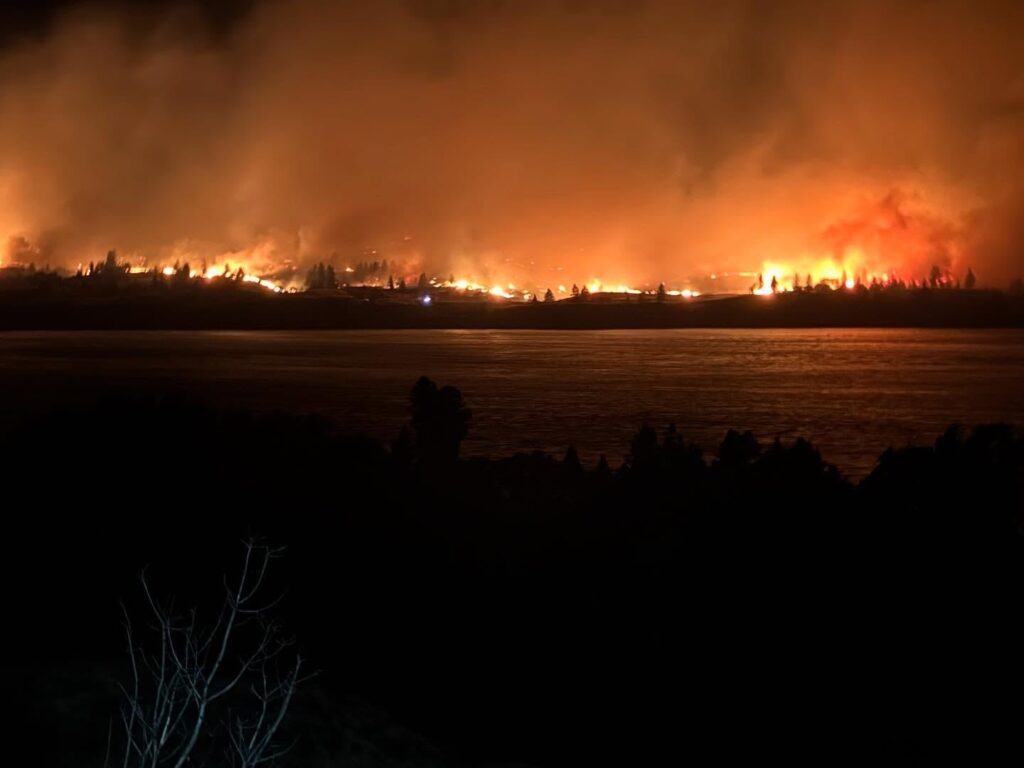Despite initial bipartisan support, a bill that would have offered some federal tax relief on settlements made to survivors of utility-caused wildfires expired in the closing hours of the Oregon legislative session in June.
The proposal’s supporters blamed the failure on Democratic lawmakers’ last-minute decision to change the bill and roll it into a completely different package in the final days of the session, which would have required utilities to pay federal income taxes on settlements to wildfire survivors.
Due to its failure to pass, unless Congress steps in, wildfire survivors who get settlements from an at-fault utility after January 2026 will be required to pay federal income taxes on the compensation. At the end of the year, a federal law that exempts these settlements from federal income taxes expires.
According to Cody Berne, a lawyer for wildfire victims at Portland-based law firm Stoll Berne, utility PacifiCorp, which owns Oregon-based Pacific Power, has paid survivors of several of the 2020 Labor Day fires an average of almost $5 million. Many of those impacted are still awaiting their day in court after juries found PacifiCorp accountable for at least four of the devastating wildfires that destroyed thousands of homes and claimed nine lives in September 2020.
According to Berne, the typical fire survivor must give the federal government roughly one-third of their PacifiCorp payout under federal income tax rates. Abillin 2024, which exempts settlements from state income taxes, was passed by the Oregon Legislature.
Provisions forcing utilities that start a wildfire to pay federal income taxes on settlements given to survivors were part of Senate Bill 926, which was approved by the Oregon Senate in April.
Additionally, it contained language that forbade private investor-owned utilities in Oregon from collecting costs from ratepayers related to wildfire lawsuits, including fines, fees, and settlements, in the event that a court or jury determined that the firm was negligent or reckless in starting the fire. Additionally, it forbade businesses from increasing rates to cover the cost of replacing or repairing infrastructure damaged by wildfires in the event that a jury or court determined that the business was at blame for the fire.
According to the bill, electric utilities that owe money from a wildfire judgment and ongoing legal proceedings would not have been permitted to distribute dividends, income, interest, or profits to shareholders or corporate owners. Additionally, they would have been required to pay 9% interest on any damages granted to wildfire victims, beginning on the date of the fire rather than the date the damages are granted.
The bill’s main goal was to get PacifiCorp to settle with 2020 Labor Day Fire survivors more quickly.
Despite opposition from Pacific Power and Portland General Electric, the bill was supported by scores of wildfire victims who testified in person. The strength of public testimony was cited by numerous senators who supported the bill.
However, the bill was amended in the House by Jason Kropf, D-Bend, chair of the Judiciary Committee, who added that the Legislature must fund a third party to research catastrophic wildfire risk and recovery issues and that the Oregon Public Utilities Commission establish a wildfire safety certificate program that would be given to utilities that adhere to state-mandated guidelines for effective wildfire prevention.
The wildfire certificates are a component of a previous, contentious bill that was co-sponsored by Kropf and proposed by Rep. Pam Marsh, a Democrat from Ashland. Critics viewed it as providing utilities with some state-approved liability protection in the event that they were sued for allegedly being culpable in starting a fire that was started by a powerline.
Kropf made sure the bill would get to the Joint Ways and Means Committee, where it ultimately died without a committee vote, by adding the wildfire risk and recovery study, which would have to be funded by the state’s general fund. A request for an interview was not answered by Kropf.
Sam Drevo, a survivor of the Santiam Canyon labor day fires in 2020, claimed that Kropf and Marsh, D-Ashland, abandoned him and other survivors.
According to him, hundreds of fire victims traveled to Salem to provide testimony in favor of a bill intended to expedite the resolution of their lawsuits against PacifiCorp for starting fires that destroyed their homes and communities. We all related tragic tales of homelessness, suicide, loss, and death in our local neighborhoods.
By transforming the tax relief provision of Senate Bill 926 into a placeholder bill—a type of dummy bill lawmakers introduce early in the session and keep quietly on hand for the end of the session—Kropf and Marsh were able to salvage the bill in the final weeks of the session, allowing it to be replaced by a fresh, emerging proposal.
What turned intoJust four days before the last day of the 2025 legislative session, on June 23, House Bill 3984 had its first public hearing. It would have required the Oregon Public Utilities Commission to create a wildfire safety certificate program, the utilities to pay federal income taxes on wildfire settlements, and the state to fund the wildfire risk and recovery study.
Before the Senate session ended late on Friday night, the bill did not receive a final vote, despite passing narrowly on the House floor on June 27.
Drevo and Berne, along with other wildfire survivors and supporters, feel that the measure was eventually ruined by the inclusion of the wildfire safety certificate program, which also eliminated tax compensation for wildfire survivors.
Marsh disputes the claim that the law was ruined by the inclusion of the wildfire safety certificate program.
She wrote in an email that there was little chance of getting anything done because it was the last day of the session. Some senators who had backed the previous tax package that was approved by the Senate expressed disappointment that so many changes had been made by the time it cleared the House, she said.
The law would have been a significant victory for survivors, if not all of what was initially asked for in 926, she said, since that the federal tax protections expire in December. That seemed worth the last-minute effort. Mary, hail.
During the session, Marsh said she is thinking back on the numerous discussions she has had regarding utility liability and wildfire risks.
“There’s no doubt that we need to keep looking at the risks that utilities face in these days of fires,” she said. Other activists who assist with survivors undoubtedly have more suggestions for what may be suggested.
— Oregon Capital Chronicle’s Alex Baumhardt
Established in 2021, The Oregon Capital Chronicle is a nonprofit news outlet that specializes in Oregon politics, government, and policy.





More Stories
Wildfire survivors face tax burden after Oregon bill fails
Wildfire survivors face tax burden after Oregon bill fails
Wildfire survivors face tax burden after Oregon bill fails